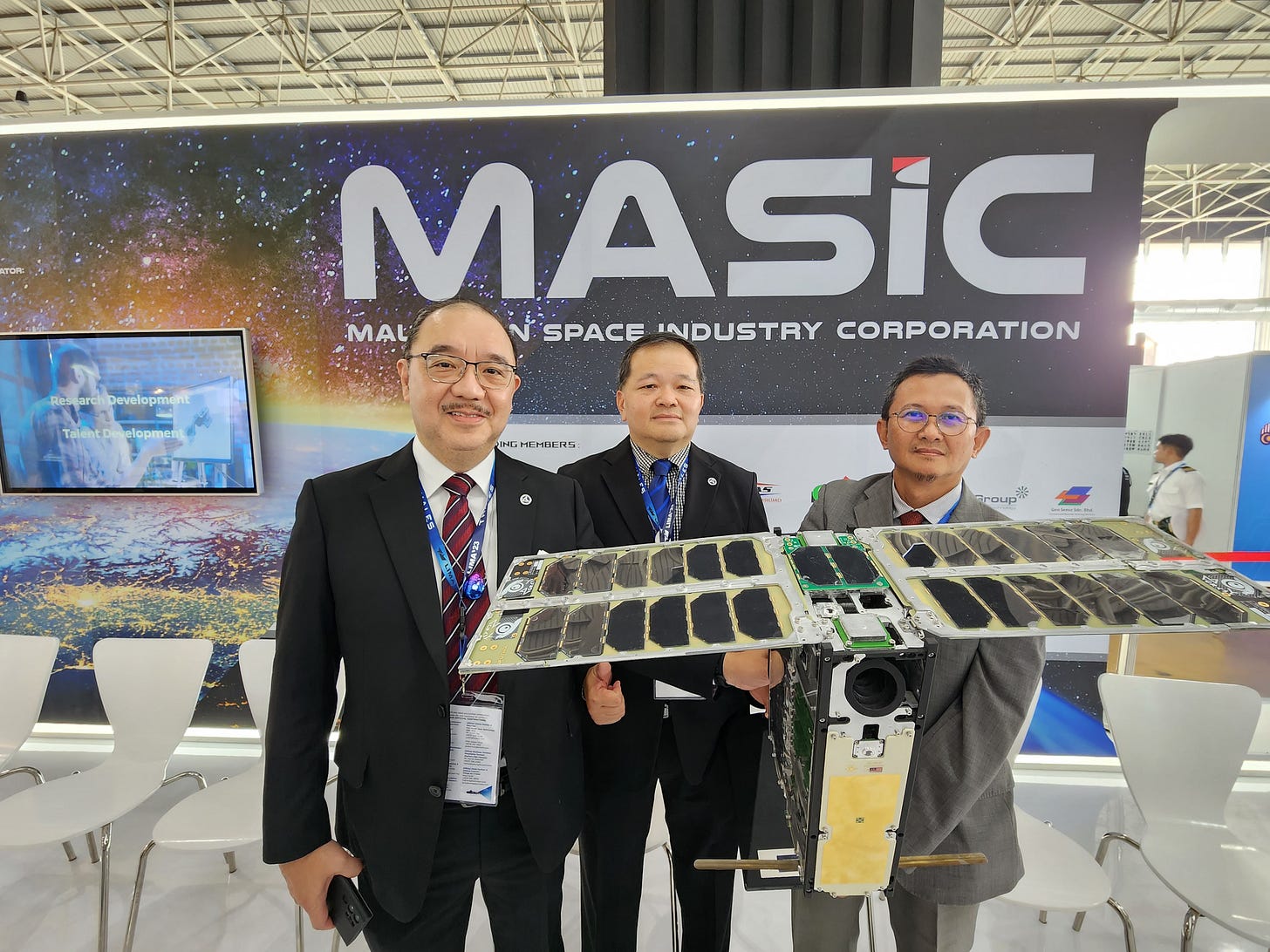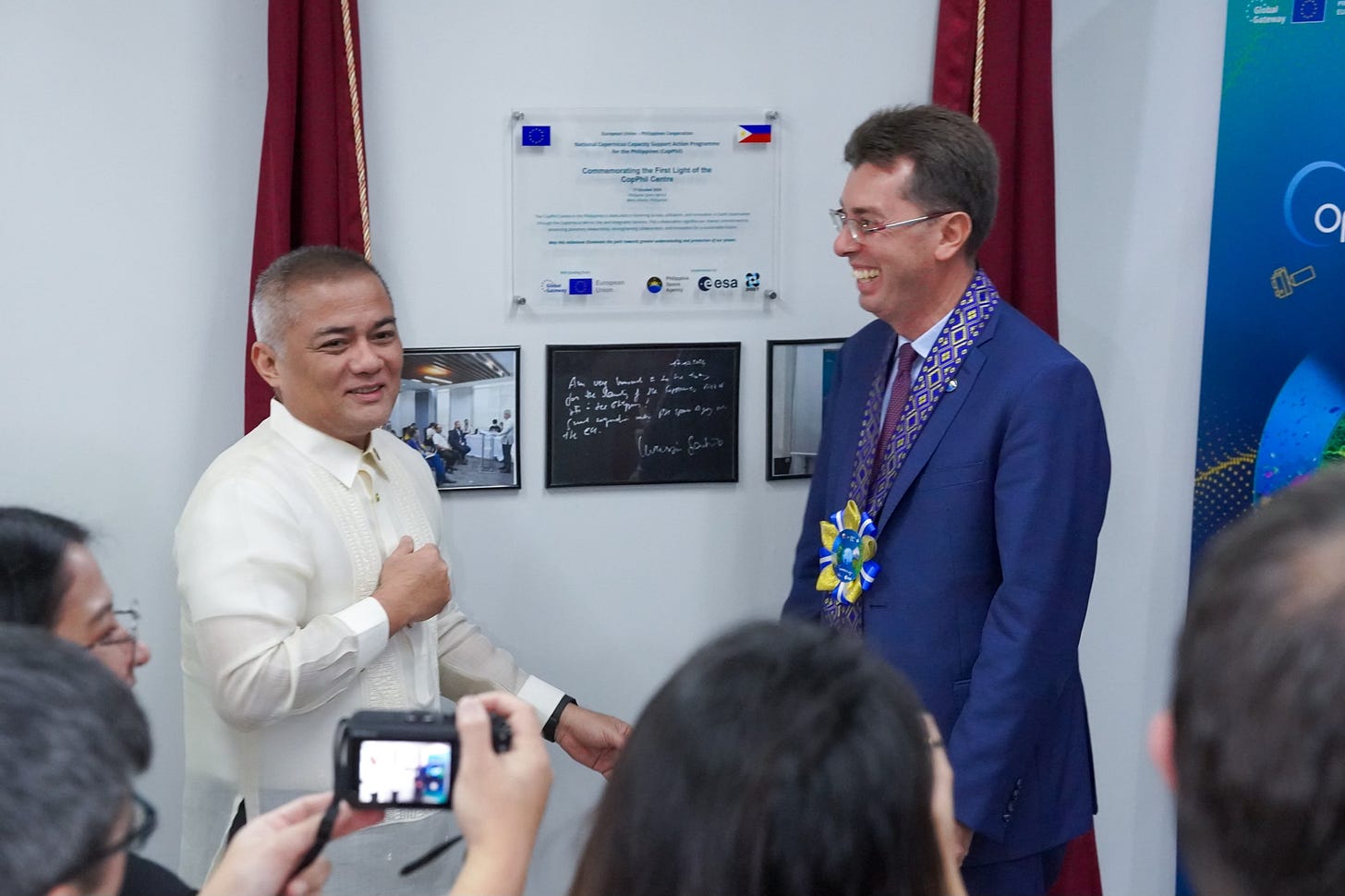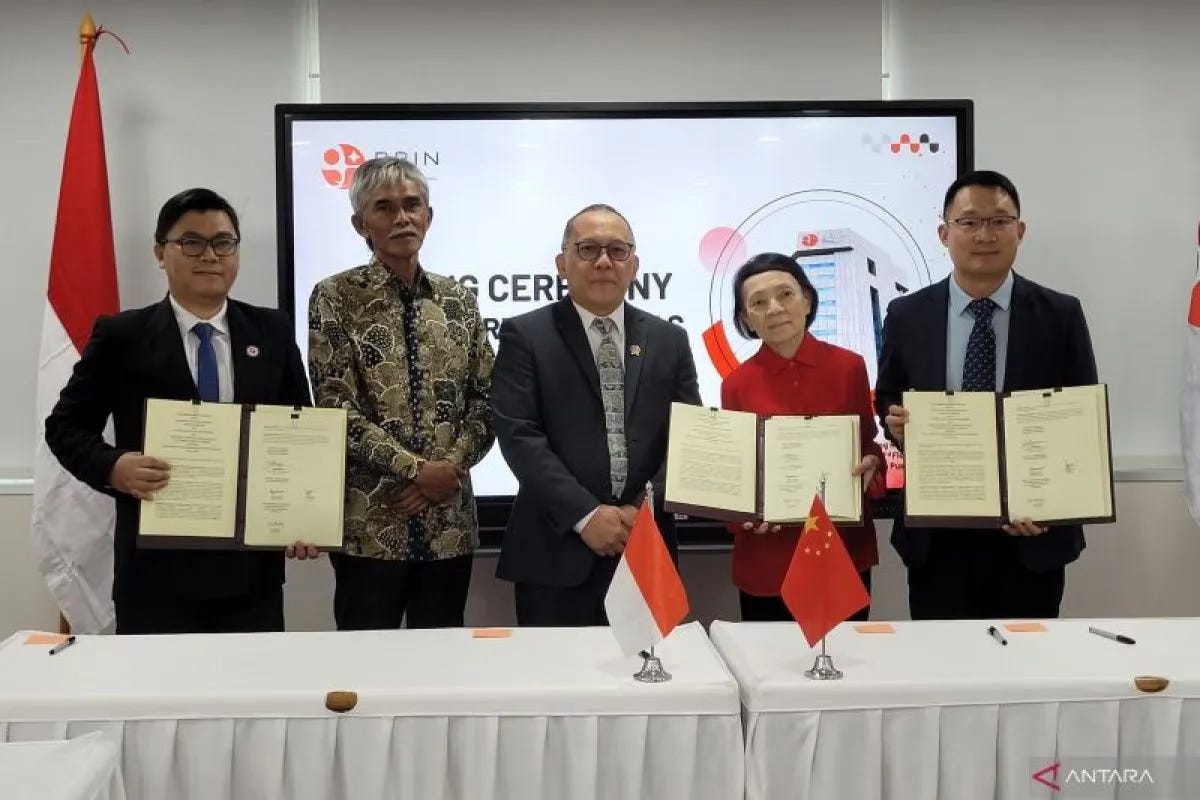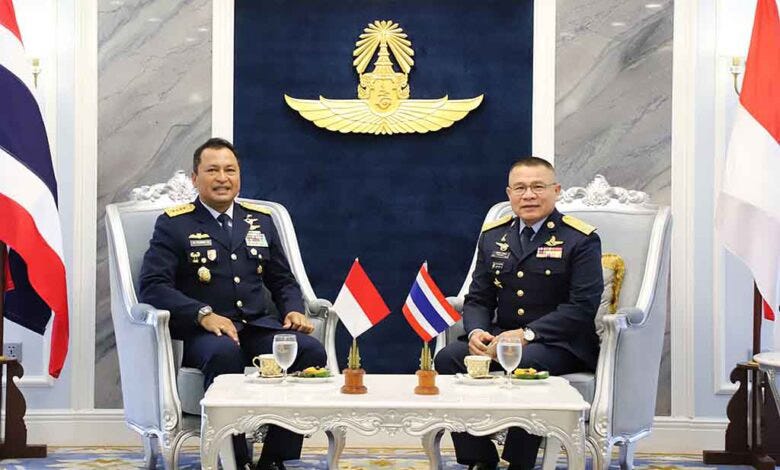Southeast Asia Space Roundup: 17 to 23 October 2024
A summary of all the space news in Southeast Asia over the past week, brought to you by AzurX

The following are the major space developments in the Southeast Asian region tracked by Southeast Asia Space Monitor over the past week:
Malaysia Space Developments
Official: Malaysia to Launch First Military Satellite by 2030
At the recent Space Defence and Security Summit and Summit on Earth Observation held in Paris, government officials emphasised the growing importance of sovereignty in national space capabilities, reflecting a shift towards prioritising space defence amid ongoing global conflicts and economic competition. NovaSpace CEO Pacome Revillon noted that over 50 countries now allocate dedicated military budgets for space, and the number of entities operating space infrastructure has tripled in the past six years. This trend highlights the urgency for countries to develop robust space programmes, as evidenced by Malaysia’s ambition to launch its first military satellite by 2030. Rear Adm. Mohd Fadzli Kamal, director general of the Malaysian Armed Force’s Defence Cyber and Electromagnetic Division, outlined Malaysia's focus on establishing domestic ground stations for communication satellites, to employ a predominantly local workforce in these industries. This reflects a broader commitment among countries to enhance their sovereignty and technological capabilities in the space sector.
Malaysia’s Sarawak Government Signs MoU with CENTEXS & Angkasa-X for Regional Satellite Development
Sarawak Digital Economy Corporation bhd (SDEC) has entered into a Memorandum of Understanding (MoU) with the Centre for Technology Excellence Sarawak bhd (CENTEXS) and ANGKASA-X Innovation sdn bhd (Angkasa-X) to enhance human capital development and implement AI-driven technological solutions in space-related industries. The agreement, announced during the International Digital Economy Conference Sarawak 2024, outlines plans for establishing ground stations for satellite operations and developing an assembly, integration, and testing (AIT) facility for Sarawak-owned satellites, which will support the A-SEANSAT and A-SEANLINK constellations. SDEC aims to leverage this collaboration to foster the Sarawak Digital and Innovation Ecosystem, enhancing local capabilities in satellite applications and services. CENTEXS will focus on training and accreditation in space technology, while Angkasa-X will emphasise integrating AI into satellite technology, fostering talent in satellite engineering, and supporting the growth of the Sarawak/Borneo space economy. According to SDEC CEO Datuk Sudarnoto Osman, this partnership represents a significant advancement in connectivity and communication for remote areas, promoting innovation and improving broadband services across various sectors.
Malaysia Space Industry Consortium Inducted into the IAF at IAC 2024 Milan
The induction of the Malaysia Space Industry Consortium (MASIC) into the International Astronautical Federation (IAF) at the 75th International Astronautical Congress (IAC) in Milan, Italy, marks a significant milestone in Malaysia's evolving space sector. President Datuk Kamarul Redzuan Muhamed emphasised that this membership not only recognises the country's persistent efforts to enhance its space industry but also strengthens its ability to forge strategic global partnerships. The consortium's new standing within the IAF is expected to create numerous opportunities for collaboration with leading international space organisations, thereby catalysing innovation and technological advancements. MASIC aims to further its mission of achieving self-reliance in space capabilities by 2030 while enhancing Malaysia's presence in the global space discourse. Established by the Malaysian Industry-Government Group for High Technology (MIGHT), MASIC serves as a unified platform for local space industry players to collectively improve their competencies and expertise, driving Malaysia's space sector forward.
Philippines Space News

Philippines Opens First EU Copernicus EO Mirror Site in Asia
On 17 October 2024, the Philippine Space Agency (PhilSA), in collaboration with the European Union (EU) and the Department of Science and Technology (DOST), launched the CopPhil Centre, which will serve as the first Copernicus mirror site in Asia. This infrastructure program aims to facilitate easier access to satellite data from the European Space Agency's (ESA) Copernicus Earth observation programme, utilising cloud storage provided by Polish company CloudFerro. PhilSA Director General Joel Marciano emphasised that this initiative will enhance the Philippines' capabilities in monitoring land cover, marine environments, and ground motion, providing critical insights into issues such as land use changes, forest cover, and disaster risk assessment. The timely availability of this data is particularly important for disaster response, enabling local scientists to identify flooding and assess damage more efficiently. The CopPhil Centre aligns with the EU's Global Gateway strategy and the United Nations’ Sustainable Development Goals, positioning the Philippines as a potential hub for distributing European satellite data across Southeast Asia. This development reflects the Philippines' commitment to leveraging advanced satellite technology to address climate change challenges and improve its overall disaster management capabilities.
UK Ambassador to the Philippines Notes Cooperation on Earth Observation Satellite
On Philippines-UK Friendship Day, the British Ambassador, Laure Beaufils, celebrated the strong ties between the two island nations, emphasising their commitment to mutual support and global contributions. The festivities included the Great British Festival in Taguig and Filipino fiestas in several UK cities, showcasing a vibrant exchange of culture through music, food, and traditions. The events reflect the successful cultural collaborations over the past year, including art exhibitions and film festivals that celebrate the rich heritage of both nations. Additionally, the Ambassador highlighted the historical partnership that has yielded benefits for both countries, particularly in innovation areas such as science, AI, and climate action. Notably, the UK is collaborating with the Philippine Space Agency on the country's largest Earth observation satellite, marking a significant technological advancement. As the new British government prioritises economic growth and global partnerships, the Philippines is recognized as a valued ally with immense potential for future collaboration, reinforcing the importance of their longstanding friendship.
Philippine Space Agency to Hold Free Week-Long Satellite Data Course
The Philippine Space Agency (PhilSA) is inviting educators, professionals, and researchers to apply for a Training Course on Downstream Data Utilization, scheduled for 25-29 November 2024, in Quezon City. This face-to-face programme aims to equip participants with essential skills in remote sensing, Geographic Information Systems (GIS), and satellite data applications. The curriculum will cover topics such as remote sensing principles, sensor systems, digital image processing, spatial data analysis, and field data collection techniques. Eligibility is extended to teachers, professionals, graduate students, and researchers in relevant fields, with only thirty slots available. Interested individuals must submit an application by 31 October 2024, including recommendation letters and a recent ID photo. The course is free, with PhilSA providing accommodation and meals; however, participants are responsible for their own transportation and any additional expenses. This initiative underscores PhilSA's commitment to enhancing capacity in space science and technology applications among Filipino educators and researchers.
Indonesia Space Developments
Official: New Indonesian Presidential Administration Will Focus on Space Technologies
Laksana Tri Handoko, head of Indonesia's National Research and Innovation Agency (BRIN), has emphasised that research and innovation, particularly in the space sector, will be a key priority for the incoming administration of President-elect Prabowo Subianto. Handoko highlighted the significance of developing national capabilities in space to bolster Indonesia's sovereignty, noting the country's current reliance on telecommunications satellites. The government aims to enhance its space research and innovation efforts, which are seen as crucial for maximising the utilisation of space resources. Additionally, the new government is focused on achieving net zero carbon emissions through initiatives such as constructing a Nuclear Power Plant and developing renewable energy sources, including biodiesel, bioethanol, and green energy from wind and solar power. Strengthening human resources in research and innovation is central to the Prabowo-Gibran administration’s agenda, which seeks to position Indonesia as a leading supplier of green energy and ensure robust investment in education, science, and technology.

Indonesia, China, Sign MoU to Establish 19-Satellite Earth Observation Constellation
The National Research and Innovation Agency (BRIN) of Indonesia has entered into a memorandum of understanding (MoU) with the Innovation Academy for Microsatellites of the Chinese Academy of Science (IAMCAS) and private sector partners to establish a remote sensing satellite constellation. BRIN head Laksana Tri Handoko stated that this collaboration is crucial for Indonesia, which has been reliant on purchasing satellite imaging data from foreign providers. The new satellite constellation, comprising 19 optical and synthetic aperture radar (SAR) Earth observation satellites, aims to enhance Indonesia's capabilities in accessing satellite imagery for diverse applications, including weather monitoring, climate research, urban planning, disaster mitigation, and national security. Handoko emphasised that this initiative will allow Indonesian ministries, institutions, and private entities to source satellite data domestically, with BRIN positioned as the future provider of these services. The partnership also highlights a commitment to local manufacturing of satellites, fostering a collaborative environment for technological development in Indonesia’s space sector.
Indonesia’s TelkomSat Recognised for National SATCOM Services
Indonesia’s Telkomsat has achieved recognition by securing third place in the Supplier/Vendor category at the 2024 BUMN Champion Partner Appreciation event held in Jakarta. This accolade was awarded in the presence of high-ranking officials, including Deputy Minister of State-Owned Enterprises Kartika Wirjoatmodjo, and underscores the importance of suppliers and vendors in delivering essential goods and services to state-owned enterprises (SOEs). Telkomsat's President Director, Lukman Hakim Abd. Rauf, received the award and highlighted the significance of collaboration within the TelkomGroup, which facilitates innovative and sustainable solutions to meet Indonesia's satellite-based telecommunications demands across various strategic sectors. This recognition reinforces Telkomsat's role as a strategic partner in advancing national economic growth and reflects its commitment to fostering a resilient and sustainable business ecosystem through continued innovation and high-quality service delivery.
Thailand Space News
Thai PM Proposes China Establish Satellite Launch Base, LEO SATCOM Services in Thailand
During a recent meeting with the Chinese Ambassador to Thailand, Prime Minister Paetongtarn Shinawatra proposed the establishment of a satellite launch base in Thailand to support the deployment of 6G technology, highlighting a strategic initiative to strengthen economic cooperation between the two countries. This discussion coincides with preparations for the 50th anniversary of diplomatic relations, which will be marked by cultural exchanges and the arrival of giant pandas as goodwill ambassadors from China. The ambassador reaffirmed China's commitment to enhancing bilateral cooperation, particularly in trade and investment in emerging industries. Key agreements from the talks included the approval of Guanlei Port as a fruit import checkpoint and a call for Chinese companies to invest in Thailand’s data centres, electric vehicle manufacturing, and low-Earth orbit satellite operations. As part of the ongoing celebrations, cultural exchanges will extend into 2025, with plans for the temporary enshrinement of China's Buddha Tooth Relic in Thailand. This partnership reflects a broader effort to deepen ties and foster mutual benefits in the evolving technological landscape.
Thailand’s NBTC Likely to Award Two GEO Slots to Thaicom Subsidiary
Thailand’s National Broadcasting and Telecommunications Commission (NBTC) has awarded TC Space Connect, a subsidiary of Thaicom, the winning bid for two remaining satellite orbit packages after a thorough review process, making them the sole contender for the licenses. The packages in question include slots at 50.5° East, 51° East, and 142° East, in geostationary orbit (GEO) with negotiations set to finalise on 21 October 2024, ahead of the impending expiration of the 50.5° East slot on 27 November 2024. Sources indicate that TC Space Connect's proposal aligns with NBTC's conditions, potentially leading to modifications aimed at maximising benefits for the country. The NBTC had previously held its first auction for satellite orbit slots in January 2023, and in a recent regulatory shift, it removed the requirement for successful bidders to launch satellites within three years, while still emphasising the necessity for maintaining national rights to these orbits. This decision reflects the evolving landscape of satellite operations in Thailand and the strategic importance of these orbital slots for future telecommunications and broadcasting initiatives.
Other Regional Space Developments

Indonesia and Thailand Air Forces to Strengthen Military Space Cooperation
The air forces of Indonesia and Thailand are strengthening their defence cooperation in the Indo-Pacific, focusing on space and cyber defence, joint military exercises, and humanitarian assistance and disaster relief (HADR). Recently, Air Marshal Tonny Harjono of Indonesia and Air Chief Marshal Punpakdee Pattanakul of Thailand discussed enhancing the Elang Thainesia military exercise, a key collaboration since the 1980s aimed at improving interoperability and operational standards, particularly with their shared use of Western-made weapon systems. As both ncountries face increasing cyber threats, they are committed to enhancing information sharing, cyber intelligence, and network security. The partnership also emphasises space cooperation, leveraging Indonesia's strategic position for potential satellite launches, and joint disaster response efforts, which are crucial for regional stability. This collaborative approach fosters mutual understanding and regional confidence, serving as a model for Association of Southeast Asian Nations (ASEAN) cooperation amid geopolitical tensions, especially concerning disputes in the South China Sea.
Myanmar is Asia’s GNSS-Jamming Hotspot
Myanmar has become the epicenter of GPS jamming in Asia, with a significant concentration of interference in the southern region, as evidenced by a map from Flightradar24 showing high levels of disruption to satellite-guided navigation systems. This jamming, which saturates GPS receivers with unknown signals, poses serious risks for aviation, including flight deviations and potential collisions, especially during critical flight phases. Analysts attribute the recent increase in jamming incidents to state-driven efforts to protect military targets amidst escalating drone warfare, particularly following attacks on military installations by opposition forces. The situation in Myanmar has evolved, with the military enhancing its drone capabilities in response to threats, thus narrowing the technological gap with resistance forces. Southern Myanmar now ranks among the top regions for GPS disruptions, following conflict zones in the Middle East and Ukraine, yet there have been no reported navigation issues for civilian or military aircraft. This trend raises alarms among aviation regulators globally, highlighting the need for enhanced safety protocols and data sharing on global satellite navigation systems (GNSS) to mitigate the risks associated with GPS interference.
Singapore to Benefit from U.S. Space Technologies Export Control Reforms
The U.S. Commerce Department has announced significant reforms to its export regulations for space-related technology, easing restrictions that have long been a point of contention for the industry. This marks the first substantial update in a decade, aimed at enhancing opportunities for U.S. companies to sell satellite hardware internationally, particularly to allied nations such as Australia, Canada, and the UK. Key changes include allowing the export of various products related to remote sensing and spacecraft logistics without a license to over 40 allied countries, including Singapore. Additionally, certain spacecraft components will be shifted from the restrictive U.S. Munitions List to the more flexible Commerce Control List, facilitating trade while still protecting critical military technologies. The Aerospace Industries Association has welcomed these changes as a means to bolster the U.S.'s leadership in space technology and strengthen international partnerships. Overall, this regulatory overhaul is seen as a strategic move to support the growing space industrial base while maintaining national security interests.
Be sure to catch up with space activities in the region in the next edition of Southeast Asia Space Monitor’s space roundup!



